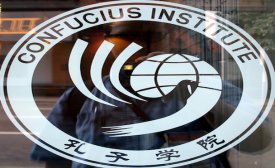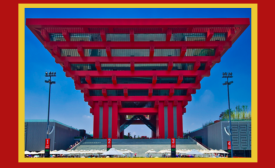propaganda
When it comes to China stories, people will believe almost anything. Take, for instance, the reports about pollution being so severe in Beijing that residents now watch radiant sunrises broadcast on a huge screen in Tiananmen Square. When it comes to China stories, people will believe almost anything. Take, for instance, the reports about pollution being so severe in Beijing that residents now watch radiant sunrises broadcast on a huge screen in Tiananmen Square.
Dennis Rodman may have had some extracurricular activities on his schedule the last time he visited North Korea. The rumor in Pyongyang is that Kim Jong Un rolled out more than just the red carpet for the former NBA star
Confucius Institutes (CIs) are probably China’s most prominent, but also most controversial cultural diplomacy tool. There is a lot of debate going on concerning the political implications of CI’s, especially in the U.S. (the most recent example can be found here) but also elsewhere. While these debates are absolutely necessary and helpful to better understand these institutes, it sometimes seems there is more guessing and speculation rather than a fact based discussion.

Confucius Institutes (CIs) are probably China’s most prominent, but also most controversial cultural diplomacy tool. There is a lot of debate going on concerning the political implications of CI’s, especially in the U.S. (the most recent example can be found here) but also elsewhere.
Art from the Democratic People’s Republic of Korea is a trademark for contemporary socialist realism. You can actually purchase DPRK art online—everything from propaganda posters to lucid landscapes, flower bouquets, and even family portraits. Sure, the propaganda posters sell best (they’re also the cheapest), but the jewel paintings are another thing entirely (rare and glitzy, completely made of stones).
Everywhere he looks nowadays, Nicolás Maduro sees conspiracies. At least a dozen plots to assassinate him have allegedly been detected since he became Venezuela’s president in April. Mr Maduro recently expelled three American diplomats for supposedly conspiring with the opposition, business groups and unions to wage “economic war” and overthrow the government. Some plots may even be real: there are rumours of discontent in the armed forces, on which the president is lavishing time and money. But publicly, at least, the opposition media are Mr Maduro’s prime suspects.
The increased tempo of Beijing’s public diplomacy activities in recent years, from Confucius Institutes to the 2010 Shanghai World Expo, have received poor to mediocre reviews internationally. Expensive projects have been received positively by the Chinese public, but have done little to reverse China’s continued international image problems. Although a narrative of crisis pervades international scholarship on Chinese public diplomacy, there appears little evidence to suggest that Beijing is concerned.

The increased tempo of Beijing’s public diplomacy activities in recent years, from Confucius Institutes to the 2010 Shanghai World Expo, have received poor to mediocre reviews internationally. Expensive projects have been received positively by the Chinese public, but have done little to reverse China’s continued international image problems. Although a narrative of crisis pervades international scholarship on Chinese public diplomacy, there appears little evidence to suggest that Beijing is concerned.







